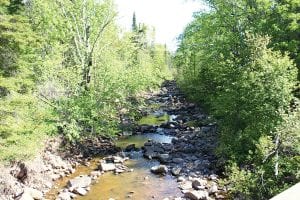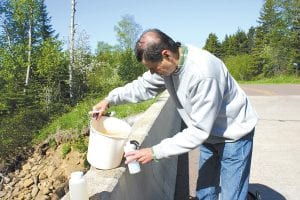The Flute Reed Partnership, which has been monitoring the water in the Flute Reed River (top) for several years, will be receiving $540,603 for its restoration initiative. Right: FRP volunteer Rick Schubert pours a water sample into a special container to be sent to the Minnesota Pollution Control Agency.

Members of the Flute Reed Partnership (FRP) were surprised—and extremely happy—to learn that the partnership’s request for a grant from the Great Lakes Restoration Initiative had been granted. The partnership teamed up with the Minnesota Pollution Control Agency (MPCA) on a $540,603 application called the Flute Reed River Restoration Initiative. The project on the nine-mile Flute Reed River is one of only 14 selected out of 60 submitted from Minnesota.
Rick Schubert of FRP noted that when the application was submitted, FRP’s chance of being funded was “pretty remote.” He happily echoed the statement of Dave Stark, Cook County’s former water planner, who said he was “speechless” when he heard the news.
Schubert said, “This is tremendous news for a number of reasons, primarily because it will help clean up the river, but it also saves the Cook County residents tax money and will create employment locally.”
FRP will continue to work with the MPCA, Stark, and other Cook County officials to get a final plan submitted by the June 24, 2010 deadline.
FRP volunteers have been working with MPCA since 2007, when it received its first grant to conduct water monitoring and received training on how to collect information on the Flute Reed River. FRP’s Rick Schubert, Dick Betz and Glenn Gilyard collected water samples on six sites on the Flute Reed. They checked the water on the first and third week of each month or after any rain activity.
The News-Herald accompanied Schubert on one of those collection trips in April 2009. To obtain samples at the bridge on the Chicago Bay Road, Schubert lowered a bucket of water—carefully so as not to stir up the bottom during collection— and measured water temperature, conductivity of water, the ph level, turbidity and the amount of dissolved oxygen per liter of water. He also measured the depth of the water. Schubert logged the data and sent the water samples via UPS to RMB Enviro Labs, Inc. The river is divided into the six segments so MPCA can see how the condition of the river changes from section to section.
FRP has also been actively working to restore the watershed with tree planting within 100 feet of the river on both sides. Minnesota Department of Natural Resources (DNR) Ecologist Chel Anderson assists the tree planting efforts, helping FRP select the best species for the riverbanks. “White cedar has great root structure,” said Schubert. “Spruce, white pine, white and black spruce are all good.”
The partnership also has worked with the Minnesota Extension Service to educate people regarding erosion control. FRP members helped place erosion blankets around the patio at the Chicago Bay Marketplace, where it sometimes holds its meetings. And, the organization donated rain barrels to the Hovland Post Office for use by the Hovland Garden Club, which maintains the flowerbeds at the post office. The partnership is involved in another grant with the Minnesota Land Trust to evaluate potential areas for conservation easements along the river.
A Minnesota’s Lake Superior Coastal Program grant funded the water-monitoring program and identified the concerns on the Flute Reed. A coastal program report dated February 19, 2010, said the FRP had applied for the GLRI grant to remediate an existing bridge, replace undersized culverts and stabilize failing riverbanks.
Schubert said that since the GLRI announcement was made, some county residents have asked, “Just who are these Flute Reed Partnership (FRP) people? Maybe they’re a bunch of environmentalists from the Cities with no connection to Cook County.”
Schubert said it is a reasonable question and he shared the following information about the FRP membership. He said the FRP currently has a total of 36 paid up members. Of those, 23 own land in the Flute Reed watershed, 11 others own land in Cook County (including Schubert) and two don’t own land in Cook County.
“So, roughly 66% of our membership owns land in the watershed and a total of 94% own land in Cook County,” said Schubert. However, he acknowledged that it would be good for more landowners to be involved. “If you’re a landowner in the Flute Reed watershed, please join our effort to help our river.”
Schubert said anyone who would like to see a copy of the GLRI proposal or the FRP/MPCA final work plan can do so by contacting him by e-mail at rschub@centurytel. net.
Other regional projects funded were:
Wildlife Forever
$126,000 21st Century Invasive Species Outreach to Anglers
University of MN
$1.5 million A Comprehensive Regional Public Outreach Campaign on AIS
$390,188 Avian botulism in Cladophora: Growth, toxins & management
$198,140 Beach Information Communication System
$193,432 Restoring moose foraging habitat in Lake Superior uplands
$1.6 million GLIC GLEI II indicator testing and refinement
Minnesota Pollution Control Agency
$843,616 Amity Creek Restoration Project
$411,680 St. Louis River AO C implementation framework development
Minnesota Department of Health
$1.2 million Great Lakes Consortium Fish Consumption Advisory Enhancement
Science Museum of Minnesota
$265,235 Great Lakes Restoration Effects on Fish Mercury Levels
Great Lakes Aquarium
$134,485 Invasive species public outreach
in an aquarium setting
Community Action Duluth
$636,365 Restoring Lake Superior’s streams one neighbor at a time
Minnesota Department of Natural Resources
$1.6 million Taconite mercury emission control studies: phase one



Loading Comments